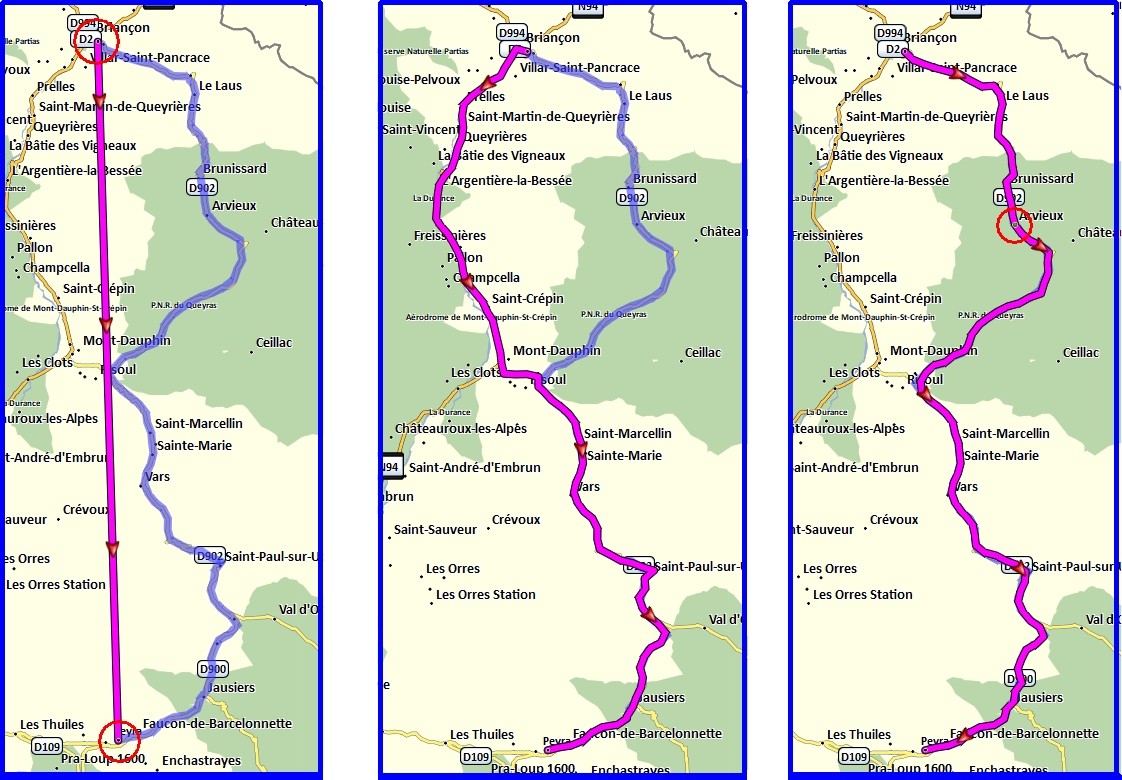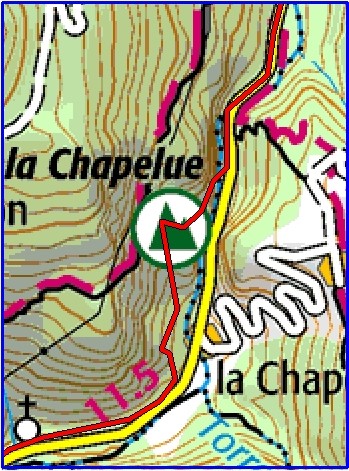Creating a Route from a Track in Basecamp.
In case you missed it my previous post, tracks do not have shaping points, via points or waypoints. They just have those many small dots which the computer or the stanav joins together with a sequence of short straight lines. It make the track look like curves, but they are not - The satnav gets out its ruler and joins adjacent dots with a short straight line.
Do they have a name. Yes they do. They are called Track Points. But you never get to see them on the satnav. Basecamp will show them though, as we have seen.
Are these the same as Ghost Points in routes ? You may be wondering this if you have been looking at other sources of information. If you haven't then don't worry about it for now.
No they are not the same as 'ghost points'. But the programs that convert tracks to routes will use the position of track points to create the route points. Programs that convert routes to tracks will simply take each invisible (ghost) point and change it to a track point.
Basecamp will convert a track into a route - but you have to specify how many points you want it to create, and it is the luck of the draw whether or not it will follow the track exactly. A better technique is to create the route using route points.
To do this, you start by displaying the track that you have on the Basecamp map and use it as a guide. In my example below, I have a track log of the same section of the Route Napolean from Briancon heading south to Barcelonnette.
I will use the Basecamp route creation tool to put a route point at Briancon and another at Barcelonnette. The three maps in the picture below represent the three stages. The magenta line is the route that I am creating. The faded blue line is the track.
Click the image to see a full size version.

- 06 Track to Route.jpg (220.44 KiB) Viewed 2280 times
Left Picture. I have created a route with two route points, circled in red. Briancon at the top, Barceloonnette at the bottom. In this example I have opted to draw a straight line between them.
So I have created a
Trip which consists of three pieces of information. 2 route points (Briancon, Barcelonnette) and a routing preferences (Direct / Straight line). The
trip describes how the route is to be drawn. The
Route is the magenta line that joins together the two route points in the way that I have requested - a straight line joining the two points.
Middle Picture. The same route points, but this time I have changed the
Trip's routing preferences to select the faster roads. So the
Trip now consists of three pieces of information - the same two route points plus the new routing preference of Faster Time. The trip still describes how the route is to be drawn - the faster route between the two route points.
The
Route is recalculated to apply the new information and is very different from the route above - the magenta line follows the original track for much of its length
Right Picture. In order to make the route follow the roads taken in the tracklog, I need to add another route point to the trip. I have created a route point at Arvieux, simply by using Basecamp's 'Insert Tool'.
The
Trip now has 3 route points (Briancon, Arvieux and Barcelonnette) in the correct order. The routing preference is still faster time, and Basecamp and the XT will use those 4 pieces of information to plot a
Route.
These 3 route points and the preference of faster time allow the route to be calculated in such a way that it is now very close to the original track.
None of the 3 route points are Waypoints. I didn't create them and save them before adding them to the trip - which is basically how Garmin defines the term Waypoint. Other mapping software often use the term Waypoint to mean any point in a trip, but Garmin doesn't. This is a forum for Zumo users, so I always use the Garmin definitions.
The three route points are part of the trip, and will become part of the route once it has been calculated. They must be set as either shaping points or via points - there are no other options. (Even if I had created them first as saved Waypoints, they would still have to be set as either shaping points or via points.
There is no choice about the first and last point - they are always set as Via Points. The middle point could be either a shaping point or a via point and for once I don't care what it is. When Zumo or Basecamp calculates a route it will always create one which passes through all of the route points, no matter whether it is Via or Shaping. All I am interested in at the moment is having a route from which I can create a track that has exactly the same shape and follows exactly the same roads.
There are a few glitches. In a few places, my original track log seems to wander away from the road. On such example is shown on this 1:100,000 scale map (1cm - 1Km) of France. The track log shows the route that I took on 1st Sept 2014, yet there is no road there. So thi is an error in my recorded track log. At the time I was in a very steep sided valley - indicated by how close together the contour lines are packed. At these particular spots, the view of the satellites must have been compromised, so the accuracy of my position will have been pretty poor. It has recorded 7 points which are obviously inaccurate, and joined them together with straight lines. This is what it normally does, but now they are not plotted on the road, it is very obvious.

- 07 Track Log Glitch.jpg (88.49 KiB) Viewed 2280 times
The new route is does not follow the original track with its little errors - because I was just using the track as a guide. The data in the Trip - 3 points and 'Faster' preference - seem to be enough to create a route that follows my original track quite closely - and doesn't follow the errors. Providing my 3 points are accurately placed !
So this is a warning about using tracks from unknown sources - if they have been created from someone's track log; if they have been drawn freehand; if they have been created using different maps. In any of these situations there could be places where the track isn't placed exactly on the road, and this may cause problems for the Zumo when it comes to calculating a route.
Once you have your new route has been drawn, it is a simple matter of using that to create a track in Basecamp: On a PC, Right click the route, and select 'Create Track from selected Route'.
So now you have three things:
A Trip - which describes how the route should be calculated by the software (Basecamp or Zumo).
A Route, which is the one that Basecamp created.
A Track, which follows exactly the same line as the new Route that Basecamp has just created.
Trip / Route footnote
Most people - including me on occasions - when using the Zumo screen think of using the Trip Planner App as 'Creating a Route', rather than 'Creating a Trip'. This is easy to understand why - but Garmin themselves have named the "Trip Planner App" which is what you use before any magenta line is drawn on the map. The Trip defines the rules to be followed when the route is calculated and drawn.

